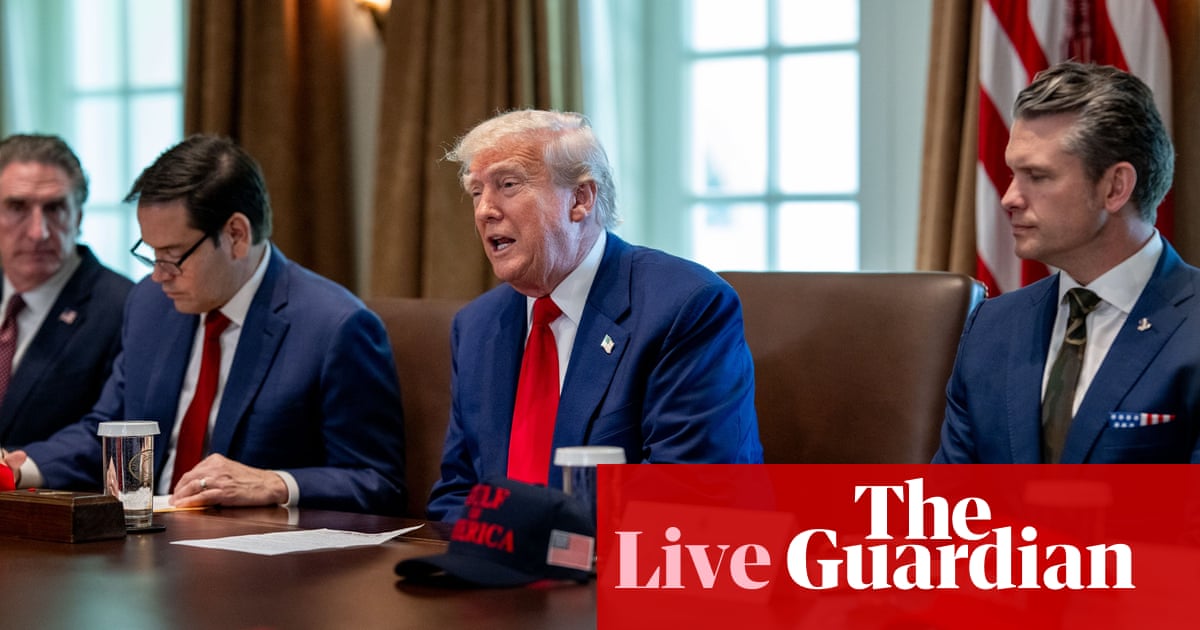Trump blames Biden for US economy shrinking as Harris says US president’s America is ‘self-serving’
President Donald Trump continued to blame Joe Biden as the US economy shrank in the first three months of the year, according to official data. While it has triggered fears of an American recession and a global economic slowdown, Trump has sought to blame Biden for the figure.
“This is Biden’s Stock Market, not Trump’s,” the Trump wrote on Truth Social, adding that the contraction “has NOTHING TO DO WITH TARIFFS”.
Meanwhile, former US vice-president Kamala Harris hit out at Trump and his backers on Wednesday, in her first major speech since losing November’s election.

The defeated Democrat told supporters the apparent “chaos” of the last three months was actually the realization of a long-cherished plan by conservatives who are using Trump to twist the US to their own advantage.
“What we are, in fact, witnessing is a high velocity event, where a vessel is being used for the swift implementation of an agenda that has been decades in the making,” she told an audience in San Francisco.
She continued:
An agenda to slash public education. An agenda to shrink government and then privatize its services. All while giving tax breaks to the wealthiest.
A narrow, self-serving vision of America where they punish truth-tellers, favor loyalists, cash in on their power, and leave everyone to fend for themselves.
Harris was a guest speaker at an event run by Emerge, a political organization that recruits and trains Democratic women to run for public office.
She told the crowd that Trump was targeting universities and courts because he wanted to cow the opposition.
More on this story in a moment, but first, here are some other key developments:
-
The US and Kyiv have signed an agreement to share revenues from the future sale of Ukrainian minerals and rare earths, sealing a deal that Donald Trump has said will provide an economic incentive for the US to continue to invest in Ukraine’s defense and its reconstruction after he brokers a peace deal with Russia.
-
The Trump administration has been in touch directly with the Salvadorian president Nayib Bukele in recent days about the detention of Kilmar Ábrego García, the man wrongly deported to a notorious prison in El Salvador, according to two people familiar with the matter. The nature of the discussion and its purpose was not clear because multiple Trump officials have said the administration was not interested in his coming back.
-
Kristi Noem, the US homeland security secretary, said that if Ábrego García was sent back to the US, the Trump administration “would immediately deport him again”. Noem’s comments come as a federal judge again directed the Trump administration to provide information about its efforts so far, if any, to comply with her order to retrieve Ábrego García from an El Salvador prison.
-
Trump dismissed concerns about the need for trade with China during a cabinet meeting on Wednesday. “You know, somebody said, ‘Oh, the shelves are going to be open’”, the president said, confusing empty shelves with open ones. “Well, maybe the children will have two dolls instead of 30 dolls” he continued. “And maybe the two dolls will cost a couple of bucks more than they would normally”.
-
A Senate resolution to overturn Donald Trump’s tariffs, by declaring that there is no national emergency as the president says there is, narrowly failed to pass on Wednesday, with the vote count deadlocked at 49-49 as two senators who supported the move failing to vote.
-
Mohsen Mahdawi walked out of immigration detention after a federal judge in Vermont ordered his release. The Palestinian green-card holder and student at Columbia University had been detained and ordered deported by the Trump administration on 14 April despite not being charged with a crime.
-
The Trump administration is moving to cancel $1bn in school mental health grants, saying they reflect the priorities of the previous administration.
Key events

Jessica Glenza
The federal government has slashed research since Donald Trump took office – hacking away at the National Institutes of Health (NIH) and its grants, staff and long-held partnerships with academia.
Now, some private companies said they want to pick up strands of research that might have otherwise been funded by the federal government. The effort has stoked little optimism among experts, who caution that private efforts cannot remotely replicate the breadth, depth or public service provided by federal funding.
“We can’t wait four years to do any women’s health research,” said Priyanka Jain, co-founder and CEO of the start-up Evvy. The company sells at-home vaginal microbiome tests – a product the company argues can help women better understand common conditions such as bacterial vaginosis.
Jain said Evvy is funding a small trial to identify biomarkers, or physical indicators, of how the vaginal microbiome can impact in vitro fertilization (IVF) success rates.
“There are companies like Evvy raising venture dollars and doing the work the government is not doing,” said Jain. “Women step up and actually solve this problem.”
In contrast, health policy insiders such as Sean Tipton, chief policy officer at the American Society for Reproductive Medicine, said the many small projects that hope to keep research alive cannot remotely match the retreat of federal government research.
“It is absolutely not realistic to think that the resources of the federal government can be replaced through some combination of philanthropic and for-profit entities trying to fill the gap,” said Tipton.
Trump has launched more attacks on the environment in 100 days than his entire first term

Oliver Milman
Donald Trump has launched an unprecedented assault upon the environment, instigating 145 actions to undo rules protecting clean air, water and a livable climate in this administration’s first 100 days – more rollbacks than were completed in Trump’s entire first term as US president.
Trump’s blitzkrieg has hit almost every major policy to shield Americans from toxic pollution, curb the worsening impacts of the climate crisis and protect landscapes, oceans, forests and imperiled wildlife.
In all, the second Trump administration has launched 145 actions – a dizzying rate of more than one a day since the 20 January inauguration – to repeal or weaken environmental rules and escalate the use of planet-heating fossil fuels, a Guardian analysis has found. The total is derived from research by Columbia Law School, Harvard Law School and administration announcements.
While many of these initial moves are far from complete and face severe legal challenges, or years of further rule-making, the pace of the rollbacks is already set to outstrip Trump’s entire first presidency, which saw about 110 environmental rules scaled back or revoked.
“What we’ve seen in this first 100 days is unprecedented – the deregulatory ambition of this administration is mind-blowing,” said Michael Burger, an expert in climate law at Columbia University.
“They are doing things faster and with less process than last time, often disregarding the law. The intent is to shock, overwhelm and to overcome resistance through sheer force of numbers.”
Through executive orders, agency memos and other policy moves, the Trump administration has deleted a swath of Joe Biden-era green policies, frozen climate spending, removed the US from the Paris climate accords and set about rewriting pollution standards for cars, trucks and power plants.
The US health secretary, Robert F Kennedy Jr, defended his handling of the measles outbreak in Texas during Wednesday night’s NewsNation town hall, in which Donald Trump also spoke.
According to the Hill, Kennedy briefly called into the town hall during the second hour and argued that the US is “doing better at managing the measles epidemic than probably any other country in the world”. He said the US has about 842 cases of measles, while Canada has roughly the same amount with a smaller population and Europe has “10 times that number”. He told the town hall: “Our numbers have plateaued.”
Measles cases in Texas rose to 663 on Tuesday, according to the state’s health department, an increase of 17 cases since 25 April, as the US battles one of its worst outbreaks of the previously eradicated childhood disease.
With one-fifth of states seeing active measles outbreaks, the US is nearing 900 cases, according to figures posted Friday by the US Centers for Disease Control and Prevention (CDC). The CDC’s confirmed measles cases count is 884, triple the amount seen in all of 2024.
Kennedy also spoke about vaccinations. “That’s one of the things that [Centers for Disease Control and Prevention] has not done,” he said. “CDC has said the only thing that we have is vaccination. There’s all kinds of treatments for when people do get sick, and those people should be treated with compassion.”
Michael Sainato
The Trump administration is seeking to strip collective bargaining rights from large swaths of federal employees in a test case union leaders argue is part of a broader attack on US labor unions that could land before the US Supreme Court.
A Trump win would deliver a severe blow to labor unions in the US. Some 29.9% of all federal workers were represented by labor unions in 2024 compared to 11.1% for all US workers.
On 27 March, Donald Trump issued an executive order, citing national security, to exempt collective bargaining at several federal departments for more than 1 million workers.
The order was made in tandem with lawsuits filed by the Trump administration against federal unions, including against affiliates of the American Federation of Government Employees (AFGE) in a Texas court where only one judge, a conservative, presides over the court, and the National Treasury Employees Union chapter 73 in a Kentucky court.
Last week, unions filed motions to dismiss the lawsuits, and have filed their own lawsuits against Trump’s executive order. Bipartisan legislation has also been introduced in the House to restore collective bargaining rights for targeted federal workers.
Rushab Sanghvi, AFGE general counsel, expects a decision in their lawsuit against the administration next month. But he expects the four cases are likely to end up in the supreme court.

Rachel Leingang
Protesters are expected to rally nationwide on 1 May with a focus on workers’ and immigrants’ rights in the latest round of demonstrations against Donald Trump and his administration.
May Day, commemorated as international workers’ day, comes after two massive days of protests in April – 5 April’s hands off rallies and 19 April’s day of action – drew millions to the streets across the country.
The 1 May protests are supported by hundreds of organizations and set to take place in nearly 1,000 cities, organizers said. Turnout will likely be lower than the previous two April protests because 1 May is a weekday, but tens of thousands are expected to show out.
“This is a war on working people – and we will not stand down,” a website for the national day of action says. “They’re defunding our schools, privatizing public services, attacking unions, and targeting immigrant families with fear and violence. Working people built this nation and we know how to take care of each other. We won’t back down – we will never stop fighting for our families and the rights and freedoms that propel opportunity and a better life for all Americans. Their time is up.”
A map of May Day protests shows several major metro areas have more than one rally planned. A coalition of groups in Los Angeles said they will start the day with an early morning rally, then a program and march to show solidarity with the city’s workers and immigrants. In New York, a protest iswas planned for early evening.
US and Ukraine sign minerals deal that solidifies investment in Kyiv’s defense against Russia

Andrew Roth
The US and Kyiv have signed an agreement to share profits and royalties from the future sale of Ukrainian minerals and rare earths, sealing a deal that Donald Trump has said will provide an economic incentive for the US to continue to invest in Ukraine’s defense and its reconstruction after he brokers a peace deal with Russia.
The minerals deal, which has been the subject of tense negotiations for months and nearly fell through hours before it was signed, will establish a US-Ukraine Reconstruction Investment Fund that the Trump administration has said will begin to repay an estimated $175bn in aid provided to Ukraine since the beginning of the war.
“This agreement signals clearly to Russia that the Trump administration is committed to a peace process centered on a free, sovereign, and prosperous Ukraine over the long term,” said Scott Bessent, the US treasury secretary, in a statement.
“President Trump envisioned this partnership between the American people and the Ukrainian people to show both sides’ commitment to lasting peace and prosperity in Ukraine. And to be clear, no state or person who financed or supplied the Russian war machine will be allowed to benefit from the reconstruction of Ukraine.”
Ukraine’s first deputy prime minister, Yulia Svyrydenko, confirmed in a social media post that she had signed the agreement on Wednesday. “Together with the United States, we are creating the fund that will attract global investment into our country,” she wrote. The deal still needs to be approved by Ukraine’s parliament.
Nick Robins-Early
One hundred days after Elon Musk entered the White House as Donald Trump’s senior adviser and the de facto leader of the so-called “department of government efficiency” (Doge), the Tesla CEO has left little of the federal government unscathed. Over the course of just a few months, he has gutted agencies and public services that took decades to build while accumulating immense political power.
Musk’s role in the Trump administration is without modern precedent. Never before has the world’s richest person been deputized by the US president to cull the very agencies that oversee his businesses. Musk’s attempts to radically dismantle government bureaux have won him sprawling influence. His team has embedded its members in key roles across federal agencies, gained access to personal data on millions of Americans and fired tens of thousands of workers. SpaceX, where he is CEO, is now poised to take over potential government contracts worth billions. He has left a trail of chaos while seeding the government with his allies, who will likely help him profit and preserve his newfound power.
The billionaire’s newfound sway has not come without pushback and a cost. Doge’s blitz through the government has sparked furious nationwide backlash, as well as dozens of lawsuits challenging Musk’s mass firings and accusing his task force of violating numerous laws. Musk’s personal popularity has sunk to record lows, and Tesla’s profits have tanked.
A look back at the first 100 days of the Trump administration shows the extent to which Musk’s efforts have changed the US government:
Musk says Doge ‘should definitely’ look at Federal Reserve costs – report
Elon Musk is considering sending his “department of government efficiency” (Doge) to the Federal Reserve, Bloomberg News reported on Thursday, citing a costly renovation of the central bank’s Washington DC headquarters as an example of potential government waste.
“Since at the end of the day, this is all taxpayer money, I think we certainly – we should definitely – look to see if indeed the Federal Reserve is spending $2.5bn on their interior designer,” Musk told reporters Wednesday at the White House, reports Bloomberg News.
The central bank said the increased $2.5bn headquarters renovation cost (as of 2022), is down to higher costs of building materials and labor since the project started in 2021. Musk, however, called it “an eyebrow raiser”.
The Fed’s chair, Jerome Powell, has faced attacks from Donald Trump, who has threatendto fire the head of the central bank. “Powell’s termination cannot come fast enough!” Trump said on social media last week.
Speaking to business leaders at the White House on Wednesday, Trump once again criticized Powell for not lowering interest rates. Powell has cited Trump’s massive tariffs on imports from nearly every country, except Russia, as a reason to fear inflation and so not lower rates.
“Mortgage rates are actually down slightly, even though I have a guy in the Fed that I’m not a huge fan of”, Trump said, apparently departing from his prepared remarks. “But that’s alright, these are minor details. Don’t tell him I said that please”.
“I mean, he should reduce the ener– he should reduce interest rates” the president, who has relied on loans to finance his real estate purchases for decades, said. He added:
I think I understand interest a lot better than him, because I’ve had to really use interest rates. But we should have interest rates go down, it would be positive, but it’s not going to matter that much, because ultimately what we’re creating has much more to do with other things than it does just pure interest rates, but it would be nice for people wanting to buy homes and things.

Lauren Almeida
Tesla has denied a report that its board sought to replace Elon Musk as its chief executive amid a backlash against his rightwing politics and declining car sales.
Robyn Denholm, the chair of the board at the electric carmaker, said in a statement on Tesla’s social media account on X:
Earlier today, there was a media report erroneously claiming that the Tesla Board had contacted recruitment firms to initiate a CEO search at the company.
This is absolutely false (and this was communicated to the media before the report was published). The CEO of Tesla is Elon Musk and the Board is highly confident in his ability to continue executing on the exciting growth plan ahead.
It followed a Wall Street Journal story published on Wednesday that claimed “board members” had contacted headhunters to recruit a successor about a month ago.
The reported move came as tensions grew at Tesla around falling profits and criticism of Musk for spending much of his time in Washington, where he has been helping Donald Trump slash federal spending as de facto head of the “department of government efficiency” (Doge).
It is unclear in the report whether these members were acting on behalf of the board as a collective, or if it was only some of them taking steps to find a new chief executive. The Tesla board is made up of eight people, including Elon Musk himself, his brother, Kimbal Musk, and James Murdoch, son of media mogul Rupert Murdoch.
Here is a video of Kamala Harris’s speech in San Francisco:

Lauren Gambino
Kamala Harris delivered a searing indictment of Donald Trump’s first 100 days in power, warning in her first major address since leaving office that the nation was witnessing a “wholesale abandonment of America’s highest ideals” by its president.
Speaking to an audience of Democrats in San Francisco, the former vice-president struck a defiant posture as she praised the leaders and institutions pushing back against Trump and his aggressive agenda – from the members of Congress acting boldly to the judges “who uphold the rule of law in the face of those who would jail them”, the universities defying the administration’s “unconstitutional demands”, and the everyday Americans rallying to protect social security.
The speech – her most forceful since Trump returned to power – marked a notable reemergence for Harris. The former vice-president, who now lives in Los Angeles and is weighing her next move – a possible run for California governor next year or another bid for the presidency in 2028 – has mostly kept a low profile since leaving office in January following her devastating loss to Trump in November.
In her remarks, she accused Trump of deliberately sowing fear and chaos to consolidate his own executive power, in a “high velocity” start to his presidency that hurled the country toward a constitutional crisis.
“They are counting on the notion that, if they can make some people afraid, it will have a chilling effect on others,” she said. “But what they’ve overlooked is that fear isn’t the only thing that’s contagious. Courage is contagious.”
Urging Americans to keep organizing, running for office and standing up for fundamental rights and values, she declared: “Let’s lock it in.”
‘I don’t really believe I’ve made mistakes’, Trump tells NewsNation town hall
Donald Trump declined to say when trade moves will pay off, as he too part in a NewsNation town hall via phone last night.
According to the Hill, Trump would not be drawn on when new trade deals would be announced either. In the same interview, when asked to name the biggest mistake he had made so far, the US president said he did not think he had made any.
“I’ll tell you, that’s the toughest question I can have because I don’t really believe I’ve made mistakes,” he said, arguing that the country is in a “transition period” and will see “tremendous economic victories” ahead.
Talking about tariff moves, Trump said: “And I know what I’m doing perfectly … it’s a little complicated subject”.
In the town hall, Trump said there was “a very good chance” that the US would make a deal with China on tariffs.
“Now, will we make a deal? There’s a very good chance we’re going to make a deal, but we’re going to make it on our terms,” Trump said, after calling China “the king of ripping off the United States”.
Trump blames Biden for US economy shrinking as Harris says US president’s America is ‘self-serving’
President Donald Trump continued to blame Joe Biden as the US economy shrank in the first three months of the year, according to official data. While it has triggered fears of an American recession and a global economic slowdown, Trump has sought to blame Biden for the figure.
“This is Biden’s Stock Market, not Trump’s,” the Trump wrote on Truth Social, adding that the contraction “has NOTHING TO DO WITH TARIFFS”.
Meanwhile, former US vice-president Kamala Harris hit out at Trump and his backers on Wednesday, in her first major speech since losing November’s election.
The defeated Democrat told supporters the apparent “chaos” of the last three months was actually the realization of a long-cherished plan by conservatives who are using Trump to twist the US to their own advantage.
“What we are, in fact, witnessing is a high velocity event, where a vessel is being used for the swift implementation of an agenda that has been decades in the making,” she told an audience in San Francisco.
She continued:
An agenda to slash public education. An agenda to shrink government and then privatize its services. All while giving tax breaks to the wealthiest.
A narrow, self-serving vision of America where they punish truth-tellers, favor loyalists, cash in on their power, and leave everyone to fend for themselves.
Harris was a guest speaker at an event run by Emerge, a political organization that recruits and trains Democratic women to run for public office.
She told the crowd that Trump was targeting universities and courts because he wanted to cow the opposition.
More on this story in a moment, but first, here are some other key developments:
-
The US and Kyiv have signed an agreement to share revenues from the future sale of Ukrainian minerals and rare earths, sealing a deal that Donald Trump has said will provide an economic incentive for the US to continue to invest in Ukraine’s defense and its reconstruction after he brokers a peace deal with Russia.
-
The Trump administration has been in touch directly with the Salvadorian president Nayib Bukele in recent days about the detention of Kilmar Ábrego García, the man wrongly deported to a notorious prison in El Salvador, according to two people familiar with the matter. The nature of the discussion and its purpose was not clear because multiple Trump officials have said the administration was not interested in his coming back.
-
Kristi Noem, the US homeland security secretary, said that if Ábrego García was sent back to the US, the Trump administration “would immediately deport him again”. Noem’s comments come as a federal judge again directed the Trump administration to provide information about its efforts so far, if any, to comply with her order to retrieve Ábrego García from an El Salvador prison.
-
Trump dismissed concerns about the need for trade with China during a cabinet meeting on Wednesday. “You know, somebody said, ‘Oh, the shelves are going to be open’”, the president said, confusing empty shelves with open ones. “Well, maybe the children will have two dolls instead of 30 dolls” he continued. “And maybe the two dolls will cost a couple of bucks more than they would normally”.
-
A Senate resolution to overturn Donald Trump’s tariffs, by declaring that there is no national emergency as the president says there is, narrowly failed to pass on Wednesday, with the vote count deadlocked at 49-49 as two senators who supported the move failing to vote.
-
Mohsen Mahdawi walked out of immigration detention after a federal judge in Vermont ordered his release. The Palestinian green-card holder and student at Columbia University had been detained and ordered deported by the Trump administration on 14 April despite not being charged with a crime.
-
The Trump administration is moving to cancel $1bn in school mental health grants, saying they reflect the priorities of the previous administration.

